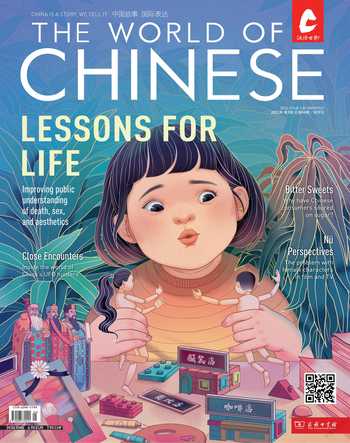The Price of Beauty
杨婷婷

When Zhu Wenqi received her postgraduate degree in mathematical modeling from Oxford University and an invitation to pursue a doctorate, she shared the good news with her 47,000 followers on Weibo.
Within days, however, the 28-year-old prodigy, who entered Oxford at 16 and worked at Morgan Stanley by 20, saw herself trending on the microblogging platform and accused of faking her achievements—by netizens who thought she dressed too well, took too many photos of herself, and dolled up too nicely to be a math genius.
Hundreds of abusive messages called Zhu an “academic socialite (学媛)”—using a character that used to mean “pretty girl” or “belle,” but has since become a slur for online mobs to shame women for acting immodestly.
The trend started in late 2020 when a popular blogger exposed an online group of self-proclaimed “socialites (名媛)” for using group-buying and camera tricks to create a false impression of wealth. A year later, an article from the state broadcaster CCTV lambasted another group of online influencers they called “Buddhist belles (佛媛),” who allegedly visited temples and photographed themselves studying sutras, lighting incense, and eating vegetarian meals in beautiful clothing just to increase their follower count and sell religious products like jade amulets.
In response to the article, short-video platform Douyin “punished” 48 Buddhist influencer accounts and banned seven permanently, while lifestyle app Xiaohongshu deleted 70 posts and banned three accounts for allegedly using religion as a marketing tactic. The article also sparked a witch hunt against other women believed to be faking their lifestyle online: “sick belles (病媛),” “volunteer belles (志愿媛),” and “divorce belles (離媛)”—accused of staging photos of their hospital treatments, good works, or even divorce certificates in order to gain clicks or sell products.
One of the banned Buddhist influencers, identified as Chen Siyan, later came forward to clarify that her family regularly visited temples, never took photos and videos during prayers, and that her photos had been used without permission by marketing accounts. Several women accused of faking sick for internet traffic by the Health Times, a paper under the state-run Peoples Daily, posted proof of their hospital stays. They wondered why women were being shamed for wearing makeup while sick or sharing photos of their recovery.
In the backlash that followed, several independent media outlets noted an obvious gender bias, as the vast majority of influencers censored or shamed as for attention-seeking were women. Online magazine Her noted similarities to earlier online witch hunts against suspected “green tea bitches (绿茶婊)”—who supposedly acted innocent but were materialistic—and “prostitutes.” “Women can never prove that they are not seeking attention, that their motives for living are not pure,” the Her article commented, calling the “belle” label “deeply misogynistic”: “[It] showed that our discourse shames women for their looks but is also hateful toward beautiful women...and have a problem with women making money.”
Recently, several women taking legal action against online defamation have also helped sour public opinion against those shaming and sexualizing female internet users—notably, a woman in Hangzhou who lost her job after two men made up a story about her being a “rich wife” having an affair with a courier.
As for Zhu, she responded by solving math problems posed by netizens via livestream, and said in an interview with education company China Youth of Tomorrow that she had started her social media accounts to bring about more understanding and less slander toward women and other minorities: “If I suffered, I hope other people will not have to suffer as much.”77409B52-D1DD-4944-B905-4D4FF0853CB0

